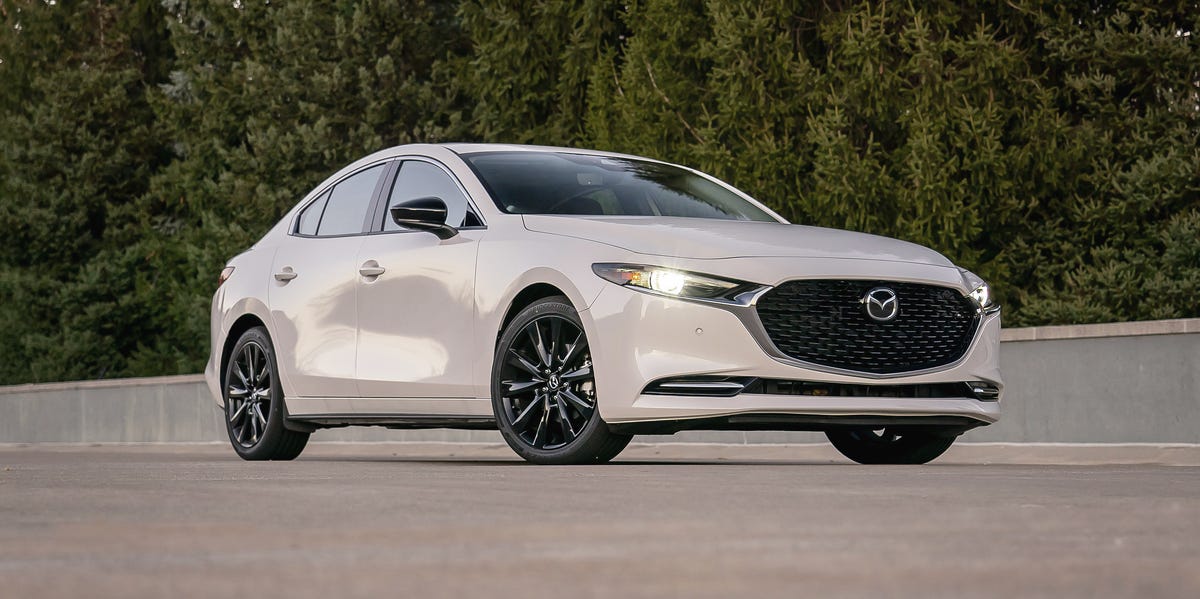
On specs alone, the 2021 Mazda 3 2.5 Turbo looks like a juiced-up punk, the kind of pint-sized terror that Mazda occasionally gins up to remind the world that it knows how to build back-road turbocharged torque grenades. Available as a sedan or hatchback, the 2.5 Turbo enlivens Mazda’s little four-door with 250 horsepower and 320 pound-feet of torque, deployed through a six-speed automatic transmission (with steering-wheel shift paddles) and all-wheel drive. That looks like the stuff of a modern-day 323 GTX, if not an automatic Mazdaspeed 3. In fact, our 2.5 Turbo sedan cracked off a 5.6-second zero-to-60-mph time, 0.2 seconds quicker than we could manage with the 263-horsepower Mazdaspeed 3 we tested back in 2006.
But that car was a boost bomb, with torque steer to shame a Saab and the demeanor of a petulant teenager. The 2.5 Turbo has a much more grownup mien, both in its overall presentation and the way it drives. It’s the high-school kid who can’t wait to graduate and say goodbye to these infants. While the Subaru WRX is out playing ding-dong ditch with bags of flaming dog poo, the 3’s 2.5 Turbo is brewing its own pour-over Sumatra and settling in for a postmodern reading of Homer’s Illiad. It wears glasses even though it doesn’t need them.
The Dodge Neon SRT-4 theorem tells us that turbocharging a small car should bring attendant rowdiness—stiff suspension, loud exhaust, a rearview filled with rear wing. But sometimes more power is just more power, and this is one of those times. If you’re looking for visual cues to signify the turbocharged Mazda 3’s power, the 2.5 Turbo has slightly larger tailpipes than the naturally aspirated version. And there’s an aero package, but it’s both subtle and optional. This isn’t a street-legal rally car, and it’s not trying to look like one—fast but not spurious.
The engine is the big news, but it’s the transmission that determines the 3’s character. A six-speed automatic borrowed from Mazda’s bigger crossovers and the 6 sedan, it’s smooth and smart but takes its time shifting. In automatic mode, a full-throttle 1-2 upshift feels like it takes as long as it would in an early automated manual, but this is a modern planetary auto. Our acceleration runs were quickest in manual mode, which seemed to liven up the shift speed. A dual-clutch transmission—or, dare to dream, a manual—would totally change the car’s personality. But you hit the street with the transmission you’ve got not the one you want, and the relaxed transmission is in sync with the rest of the car’s tuning. The 3 2.5 Turbo wants to be an Audi but not an S3. Maybe more like an A7.
The interior is worthy, bringing materials and color schemes that evoke high-end European cars. Its features, too, transcend its segment—color head-up display with street-sign recognition, 12-speaker Bose audio system, 18-inch forged BBS wheels (also now available on the non-turbo 3). Those wheels are priced at $ 919 each, but we didn’t have them on our test car. We’re pretty sure even Porsche, who would probably upholster your rims in lime green ostrich for the right price, doesn’t charge by the wheel.
The way the 3 2.5 Turbo drives belies its $ 33,395 starting price. The car just flows down the road, its steering and ride motions harmonizing such that you tend not to notice either one. The Bridgestone Turanza EL440 tires offer quick reflexes, but not sports-sedan levels of grip—0.85 g on the skidpad. Mazda’s all-wheel-drive system is quick to smother wheelspin, but a hard launch can elicit a tortured bark from the front tires before the system diverts torque rearward. And there is plenty of power. With 25 percent more displacement than the industry-standard 2.0-liter fours and a high (for a turbo) 10.5:1 compression ratio, the 2.5 is uncommonly snappy even when it’s off boost. When the boost does ramp up, 320 pound-feet of torque feels like more than enough for a car this size. Not that long ago—2013—Chevrolet was building small-block V-8s that made less torque than that.
Mazda does admit that the 2.5 Turbo’s output numbers are octane dependent. Run it on premium fuel, and you get the full 250 horsepower and 320 pound-feet. Pour in a tankful of basic slop, and those numbers drop to 227 horsepower and 310 pound-feet. But Mazda says that even then, there’s not much of a difference below 4,000 rpm. So, feel free to save a few bucks if your daily commute doesn’t involve regular visits to the redline.
In fact, commuting seems like this car’s forte, its raison d’être, but the French don’t have the perfect word to describe the thing at which it excels. A daily commute is usually some variation of dreary hell, but a 2.5 Turbo optioned like ours—including the Premium Plus package, which brings leather seats and Traffic Jam Assist adaptive cruise control with lane keeping—wouldn’t be a bad place to spend your daily drive. Our car had an as-tested price of $ 33,790, which means this way-above-average car carries a below-average price. It has some annoyances—why won’t the infotainment display just stay on the satellite radio tuner instead of requiring three steps to get there?—but that’s minor stuff. When you close the Mazda 3’s door, the sound it makes is more of a ping than a thud. And on any given drive, that’s usually the final reminder that you’re in a car that could have been a whole lot rowdier.
This content is created and maintained by a third party, and imported onto this page to help users provide their email addresses. You may be able to find more information about this and similar content at piano.io

